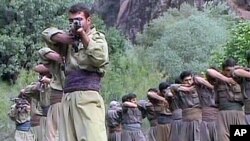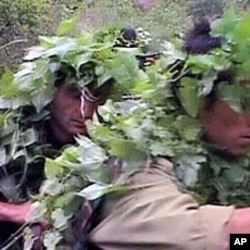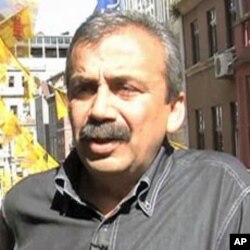The leader of the rebel Kurdish group PKK warns of a return to conflict in Turkey if the newly re-elected government does not meet the group's demands for Kurdish autonomy. Much of the focus in the election campaign was on the economy. The long-standing Kurdish issue could derail Turkey’s political progress.
Guerrilla warfare
Training in the Qendil mountains on the border with Iraq: PKK rebels that Turkey, the U.S. and the EU consider terrorists.
VOA obtained this rare picture in eastern Turkey.
The Kurdistan Workers’ Party or PKK has waged a 27-year guerrilla war for independence against the Turkish state.
Their jailed leader, Abdullah Ocalan, has warned that unless the government starts negotiations by a June 15 deadline, the group will return to conflict.
The fighting has already cost more than 40,000 lives, many of them civilians. It is a burning issue that still dominates Turkish politics.
Cause for celebration
Following Sunday’s election, pro-Kurdish parties are celebrating an increase in their number of MPs to 36 -- forcing the Kurdish issue up on the agenda.
One newly elected MP is Sirri Sureyya Onder -- a popular filmmaker in Istanbul. "The government labels anyone who is part of the Kurdish freedom movement a terrorist. Personally, I am against killing and against war and I would like it to stop. Both sides should stop and find a peaceful solution," Onder said.
Onder says language is at the heart of the fight for autonomy. "What we want is education in our own language, mother-tongue education. If there is no education in our mother tongue there will be no assimilation," he added.
In Diyarbakir, the celebrations turned to violence between Kurdish demonstrators and police. It is a familiar, almost weekly scene in this restive eastern city.
The footage above was recorded earlier this year in Diyarbakir. Kurdish human rights campaigners accuse the authorities of abuses and of targeting legal activists.
Identity
The Kurdish issue goes to the very heart of Turkish identity, says sociology professor Ferhat Kentel.
"Just imagine that all generations have learnt that ‘We are Turks’ from primary school. The socialization process is based on the homogenization of society from the rupture with the Ottoman Empire. So, Kurdish people showed that it didn’t work and Kurdish people want to be as they are," said Kentel.
Prime Minister Recep Tayyip Erdogan, victorious in Sunday’s election, claims his ruling AK party has already met many of the Kurds’ demands, and he says it will recognize the changes in a new constitution. "We will write a civilian, free constitution which braces all parties of the society together, everybody will find himself in this constitution -- east will find himself, west will find himself," he said.
Erdogan hopes those dovish sentiments will be enough to pacify the growing unrest among the Kurds.
With the Arab uprising now on Turkey’s doorstep in Syria, Turkey’s leadership needs no reminder of the dangers of a return to conflict.






